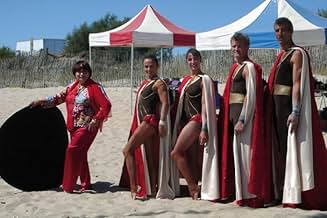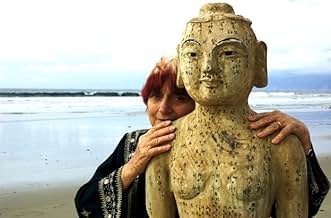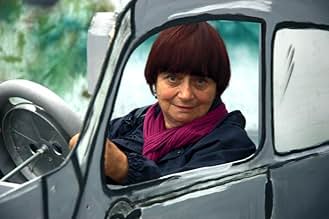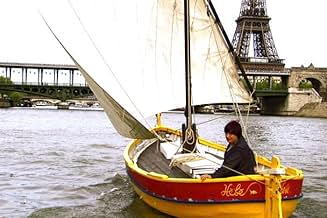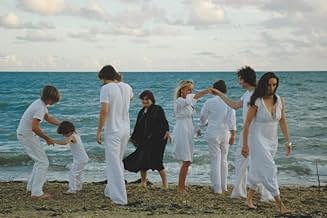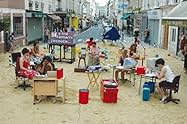VALUTAZIONE IMDb
8,0/10
5083
LA TUA VALUTAZIONE
Agnès Varda esplora i suoi ricordi, per lo più in ordine cronologico, con fotografie, filmati, interviste, rievocazioni e buffonate con giocose scene contemporanee della sua storia, tutte na... Leggi tuttoAgnès Varda esplora i suoi ricordi, per lo più in ordine cronologico, con fotografie, filmati, interviste, rievocazioni e buffonate con giocose scene contemporanee della sua storia, tutte narrate per lei stessa.Agnès Varda esplora i suoi ricordi, per lo più in ordine cronologico, con fotografie, filmati, interviste, rievocazioni e buffonate con giocose scene contemporanee della sua storia, tutte narrate per lei stessa.
- Premi
- 12 vittorie e 13 candidature totali
Gerald Ayres
- Self
- (as Gerry Ayres)
Patricia Louisianna Knop
- Self
- (as Patricia Knop)
Recensioni in evidenza
French New Wave film-maker and photographer Agnes Varda takes a look back at her life, her career, and her loves. She tells her story mostly to camera, now 80 years old - "a little old lady, pleasantly plump" - and is still full of life and wonder. She starts with her time studying art in Ecole du Louvre, the charms of the small town near Paris where she made her first film, her relationship with and love of fellow film- maker Jacques Demy, and the beginning of the French New Wave movement, and moves on to her re-location to and seduction by Hollywood, the hippy movement, her neo-Feminist views that influenced her films, and her move into photography. Most of all though, she reminisces about the eccentrics she encountered, and the photographs that immortalise her memories.
Varda seems extremely keen to cement these memories either by recording them on her ever-present video-camera, or by taking pictures. It is important to remember, it seems. She uses a number of different artistic techniques in the film. Her wonder and love of the beaches are evident at the beginning as she lays out a number of old photographs in the sand that blow in the wind, as she reminisces. She also lays out a number of mirrors facing all angles and directions, creating some fascinating images. Varda has a clear love for art, and sees it in everything she does. As she watches a man gaze out to sea, she describes him as being like Ulysses. It is clear that it is Varda herself who is like Ulysses - life has been an epic journey for her, in which she has encountered many friends and characters, and the sea is like her life, vast and beautiful, but fading into the distance.
What is so joyous about the film is how wonderfully sentimental it is. It is not patronising or forceful by overplaying sad music or having Varda cry into the camera, but instead the beauty and the melancholy are in her words, and how she describes the first time she met Demy, or how she turned a run down alley full of empty picture frames and overhanging trees into a beautiful gateway. It is so beautifully sad yet ultimately uplifting. Varda is a wonderful and intelligent lady who's love of art and creativity shines through what appears to be a short woman with a strange haircut. Less a documentary, and more of an exploration of art, love and life seen through the eyes of a woman who has lived through the very heart of it. Lyrical, beautiful, and reminds you of the true joys to be found in cinema.
www.the-wrath-of-blog.blogspot.com
Varda seems extremely keen to cement these memories either by recording them on her ever-present video-camera, or by taking pictures. It is important to remember, it seems. She uses a number of different artistic techniques in the film. Her wonder and love of the beaches are evident at the beginning as she lays out a number of old photographs in the sand that blow in the wind, as she reminisces. She also lays out a number of mirrors facing all angles and directions, creating some fascinating images. Varda has a clear love for art, and sees it in everything she does. As she watches a man gaze out to sea, she describes him as being like Ulysses. It is clear that it is Varda herself who is like Ulysses - life has been an epic journey for her, in which she has encountered many friends and characters, and the sea is like her life, vast and beautiful, but fading into the distance.
What is so joyous about the film is how wonderfully sentimental it is. It is not patronising or forceful by overplaying sad music or having Varda cry into the camera, but instead the beauty and the melancholy are in her words, and how she describes the first time she met Demy, or how she turned a run down alley full of empty picture frames and overhanging trees into a beautiful gateway. It is so beautifully sad yet ultimately uplifting. Varda is a wonderful and intelligent lady who's love of art and creativity shines through what appears to be a short woman with a strange haircut. Less a documentary, and more of an exploration of art, love and life seen through the eyes of a woman who has lived through the very heart of it. Lyrical, beautiful, and reminds you of the true joys to be found in cinema.
www.the-wrath-of-blog.blogspot.com
In a revealing and playful mood, filmmaker Agnes Varda narrates her own filmed autobiography in The Beaches of Agnes. The film begins with Varda, now 82, setting up mirrors on the beach with the sounds of one of her mother's favorite works, Schubert's Unfinished Symphony in the background Though she asserts that "Today, I'm playing a little old lady, talkative and plump," she looks anything like a little old lady. The film re-creates her life with childhood memories that take her back to homes she knew as a child in Brussels and the city of Sete where she made her first film at the age of 26.
The film is not a dry documentary, filled with reminiscences of people we never heard of. It is a work of art in itself, a celebration not only of her life, but of all life. Along the way, Varda takes us to Los Angeles (one of her favorite cities in which she lived) where she talks about and shows photos of her former husband Jacques Demy, who she announces died of AIDS in 1990, Jane Birkin, Chris Marker (dressed as a cartoon cat) and even poet, singer Jim Morrison. Varda began as a photographer and we see an example of her photos from a long time ago. While the film documents Varda's films beginning with her first Le Pointe Curé in 1956 to the present day and the first appearances on film of Gerald Depardieu, Phillipe Noiret, and Harrison Ford, she also discusses in detail and shows excerpts from her most popular films including Cléo from 5 to 7, Le Bonheur, Vagabond, The Gleaners and I, and her documentary tributes to her husband.
Rather than an egoists attempt to enhance a reputation with big events in which she participated, the film looks at small things like the uniform she had to wear in Vichy France and a scene at an outdoor flea market where the director finds cardboard cutouts of herself and other filmmakers with their works listed on the back. But there is much more. With actors dramatizing important memories from her life, The Beaches of Agnes is filled with the people, including her two grown children, places and events, including her trips to Cuba and China that contributed to her personal growth and made her the lively and vibrant person she is today. She closes the documentary by saying, "I am alive, and I remember." While we are still alive, we will remember her.
The film is not a dry documentary, filled with reminiscences of people we never heard of. It is a work of art in itself, a celebration not only of her life, but of all life. Along the way, Varda takes us to Los Angeles (one of her favorite cities in which she lived) where she talks about and shows photos of her former husband Jacques Demy, who she announces died of AIDS in 1990, Jane Birkin, Chris Marker (dressed as a cartoon cat) and even poet, singer Jim Morrison. Varda began as a photographer and we see an example of her photos from a long time ago. While the film documents Varda's films beginning with her first Le Pointe Curé in 1956 to the present day and the first appearances on film of Gerald Depardieu, Phillipe Noiret, and Harrison Ford, she also discusses in detail and shows excerpts from her most popular films including Cléo from 5 to 7, Le Bonheur, Vagabond, The Gleaners and I, and her documentary tributes to her husband.
Rather than an egoists attempt to enhance a reputation with big events in which she participated, the film looks at small things like the uniform she had to wear in Vichy France and a scene at an outdoor flea market where the director finds cardboard cutouts of herself and other filmmakers with their works listed on the back. But there is much more. With actors dramatizing important memories from her life, The Beaches of Agnes is filled with the people, including her two grown children, places and events, including her trips to Cuba and China that contributed to her personal growth and made her the lively and vibrant person she is today. She closes the documentary by saying, "I am alive, and I remember." While we are still alive, we will remember her.
Agnès Varda presented us in this autobiographical movie with her memories of a life devoted to the cinema and not only. She does that in powerful and beautiful images supported by a brilliant, witty and sensitive commentary. In this movie we can see references to several of some of the best Varda's films such as La Pointe Courte, Cléo de 5 à 7 and Le Bonheur, with images, and to some of the greatest and more important figures of French cinema such as her husband Jacques Demy to begin with and also Godard, Catherine Deneuve, Michel Piccoli, Jane Birkin and others. The cut is very intelligent and effective in visual terms combining the present and the past sometimes in simultaneous images with a special effect here and there. A masterpiece indeed.
So I finally arrive for the last leg of my journey with Varda in this self portrait. I will rest here for the time being with the beautiful introspection of it; not because she has stopped working, she hasn't, but this permits an appreciation of everything she strives to live for. For newcomers it will be a good place to start knowing her and they can deepen each chapter by going back to her earlier travels.
Introspection isn't the word actually. Varda doesn't keep things internalized, I don't get the sense of anything hidden or dimly seen. For her it is all readily available, it is all externalized and offered up to us like we are guests in her house on an afternoon and she just waves us in smiling. I get the sense of a woman who has traveled far and seen amazing things and can't wait to share it all with a giddy, sometimes shy, excitement.
This isn't the first time she is reflecting on her life of course, many of her works are self portraits on the side or inspired by real life. We learn for example that Daguerrotypes she filmed around her neighborhood because she was pregnant at the time and had to stay at home. But how does she present herself here, on this stage of her life? What images of her? Varda as grandmotherly raconteur, as young girl overcoming her shyness with men, as spirited woman who protested injustice, as wife and soulmate and explorer.
As for stories, she has been all over and has plenty to share. Traveled to China and Cuba in her twenties and came back with images of revolution. Knew Godard and speaks about her filmmaking start via Resnais. She was in Oakland in '68 to film the Panthers. Knew Jim Morrison and was with him in his last days. Lived around Warhol's circle in LA. Protested feminism with Delphine Seyrig in the streets. Marker is in the film, speaking from behind an image. These and more.
But saying that she shares it all out in the open isn't the whole truth either; truth is knowing how to sculpt it after all. You might appreciate how eloquently she speaks about discovering sex in Corsica one summer by not speaking about it. How gracefully she speaks about her marriage, sketching merely the air around unhappiness (as all marriages know); she was the woman in Documenteur. She is one of those beautiful souls who know how to move towards things, how to move back, how to see and from what distance.
The most lasting impression this leaves me with however is of a woman who glides through lives she recalls and summons to her in the beach of memory, and this is Varda herself in the actual film moving through images, photos of childhood, mirrors, a visit to her childhood home yields an impromptu discussion about model trains, clips from old films, enactments, narrations about these. But moves with an unfettered soul. She opens the film with "I'm playing the role of a little old lady, telling her life story". How to be like Varda? Explore the role of someone who happens to be the person you are growing into, be open to the encounter; no more is necessary.
For near the end she reserves a small gem that carries the wisdom of entire lives, there's more to this one line than there is in entire careers. Prior to it, we have seen a woman who has known heartbreak enough, pacing alone in the house of images (the place with strips of film hanging from walls). Now her family, kids and grandkids, are dancing nearby. Watching them she muses that they are her happiness, she doesn't know if she knows them or understands them, she just goes towards them.
Something to meditate upon.
Introspection isn't the word actually. Varda doesn't keep things internalized, I don't get the sense of anything hidden or dimly seen. For her it is all readily available, it is all externalized and offered up to us like we are guests in her house on an afternoon and she just waves us in smiling. I get the sense of a woman who has traveled far and seen amazing things and can't wait to share it all with a giddy, sometimes shy, excitement.
This isn't the first time she is reflecting on her life of course, many of her works are self portraits on the side or inspired by real life. We learn for example that Daguerrotypes she filmed around her neighborhood because she was pregnant at the time and had to stay at home. But how does she present herself here, on this stage of her life? What images of her? Varda as grandmotherly raconteur, as young girl overcoming her shyness with men, as spirited woman who protested injustice, as wife and soulmate and explorer.
As for stories, she has been all over and has plenty to share. Traveled to China and Cuba in her twenties and came back with images of revolution. Knew Godard and speaks about her filmmaking start via Resnais. She was in Oakland in '68 to film the Panthers. Knew Jim Morrison and was with him in his last days. Lived around Warhol's circle in LA. Protested feminism with Delphine Seyrig in the streets. Marker is in the film, speaking from behind an image. These and more.
But saying that she shares it all out in the open isn't the whole truth either; truth is knowing how to sculpt it after all. You might appreciate how eloquently she speaks about discovering sex in Corsica one summer by not speaking about it. How gracefully she speaks about her marriage, sketching merely the air around unhappiness (as all marriages know); she was the woman in Documenteur. She is one of those beautiful souls who know how to move towards things, how to move back, how to see and from what distance.
The most lasting impression this leaves me with however is of a woman who glides through lives she recalls and summons to her in the beach of memory, and this is Varda herself in the actual film moving through images, photos of childhood, mirrors, a visit to her childhood home yields an impromptu discussion about model trains, clips from old films, enactments, narrations about these. But moves with an unfettered soul. She opens the film with "I'm playing the role of a little old lady, telling her life story". How to be like Varda? Explore the role of someone who happens to be the person you are growing into, be open to the encounter; no more is necessary.
For near the end she reserves a small gem that carries the wisdom of entire lives, there's more to this one line than there is in entire careers. Prior to it, we have seen a woman who has known heartbreak enough, pacing alone in the house of images (the place with strips of film hanging from walls). Now her family, kids and grandkids, are dancing nearby. Watching them she muses that they are her happiness, she doesn't know if she knows them or understands them, she just goes towards them.
Something to meditate upon.
Autobiographies can be the worst or the best of things. Either a boring exercise in conceit and self-absorption or a fascinating self-exploration by a person of value.
Well, the Agnes of 'Les plages d'Agnès' being Agnès Varda there is no need to worry. She undoubtedly belongs to the second category.
It goes without saying that to fully appreciate this wonderful film you have to be a minimum acquainted with Varda's oeuvre. But a minimum is enough, for it does not take long before the lady starts captivating you, not by boasting about all the masterpieces she made, but by creating a new kind of story-telling right before your eyes.
One thing I am pretty sure of is that there is no other film, autobiographical or not, that looks like "Les plages d'Agnès".
Of course there is no question that Varda's life is rich and worth telling: she worked for and with great artists, she was married to one of the most original French directors ever (Jacques Demy), she covered the fledgling Chinese and Cuban revolutions, fought in favor of feminism when it was not yet fashionable to do so. The real issue for the director was in fact to find HOW to talk about herself. Well after viewing "Les Plages d'Agnès", I can tell her (and I am far from being the only one to think so): "You did it brilliantly, Agnès".
Indeed Agnès Varda is not content to go through the motions of the standard autobiographical movie: talking face to the camera or in voice over, interviewing witnesses of her life and illustrating her words with significant clips. She does that of course but she knows how to enrich the material through a lot original finds: the mirrors on the beaches,her walking backwards to show she goes back in time, the circus artists on the beach, recreating her Cine Tamaris production office on a fake beach in Rue Daguerre, her sailing a boat from Sete to Paris as an allegory of the evolution of her career, etc. etc. Agnès Varda never rests on her laurels throughout. Quite the contrary: she creates, invents, tries out new things sequence after sequence. In the film she calls herself 'une petite vieille' (a short old lady) but I suspect she says so out of vanity because she does not look old at all. Actually, she has retained all the freshness, all the spontaneity of the young lady she once was.
Don't refrain from seeing this film even if it does not appeal to you in the first place. When the end credits roll you will probably - just like I did - utter with a sigh: "Is it already the end?"
Well, the Agnes of 'Les plages d'Agnès' being Agnès Varda there is no need to worry. She undoubtedly belongs to the second category.
It goes without saying that to fully appreciate this wonderful film you have to be a minimum acquainted with Varda's oeuvre. But a minimum is enough, for it does not take long before the lady starts captivating you, not by boasting about all the masterpieces she made, but by creating a new kind of story-telling right before your eyes.
One thing I am pretty sure of is that there is no other film, autobiographical or not, that looks like "Les plages d'Agnès".
Of course there is no question that Varda's life is rich and worth telling: she worked for and with great artists, she was married to one of the most original French directors ever (Jacques Demy), she covered the fledgling Chinese and Cuban revolutions, fought in favor of feminism when it was not yet fashionable to do so. The real issue for the director was in fact to find HOW to talk about herself. Well after viewing "Les Plages d'Agnès", I can tell her (and I am far from being the only one to think so): "You did it brilliantly, Agnès".
Indeed Agnès Varda is not content to go through the motions of the standard autobiographical movie: talking face to the camera or in voice over, interviewing witnesses of her life and illustrating her words with significant clips. She does that of course but she knows how to enrich the material through a lot original finds: the mirrors on the beaches,her walking backwards to show she goes back in time, the circus artists on the beach, recreating her Cine Tamaris production office on a fake beach in Rue Daguerre, her sailing a boat from Sete to Paris as an allegory of the evolution of her career, etc. etc. Agnès Varda never rests on her laurels throughout. Quite the contrary: she creates, invents, tries out new things sequence after sequence. In the film she calls herself 'une petite vieille' (a short old lady) but I suspect she says so out of vanity because she does not look old at all. Actually, she has retained all the freshness, all the spontaneity of the young lady she once was.
Don't refrain from seeing this film even if it does not appeal to you in the first place. When the end credits roll you will probably - just like I did - utter with a sigh: "Is it already the end?"
Lo sapevi?
- QuizFrench visa # 118156.
- ConnessioniEdited into Film socialisme (2010)
I più visti
Accedi per valutare e creare un elenco di titoli salvati per ottenere consigli personalizzati
- How long is The Beaches of Agnès?Powered by Alexa
Dettagli
- Data di uscita
- Paese di origine
- Siti ufficiali
- Lingue
- Celebre anche come
- The Beaches of Agnès
- Luoghi delle riprese
- Aziende produttrici
- Vedi altri crediti dell’azienda su IMDbPro
Botteghino
- Budget
- 1.900.000 € (previsto)
- Lordo Stati Uniti e Canada
- 239.711 USD
- Fine settimana di apertura Stati Uniti e Canada
- 19.032 USD
- 5 lug 2009
- Lordo in tutto il mondo
- 2.235.006 USD
- Tempo di esecuzione1 ora 52 minuti
- Colore
- Proporzioni
- 1.85 : 1
Contribuisci a questa pagina
Suggerisci una modifica o aggiungi i contenuti mancanti

Divario superiore
By what name was Les plages d'Agnès (2008) officially released in India in English?
Rispondi
![Guarda Bande-annonce [OV]](https://m.media-amazon.com/images/M/MV5BZGYxNzE1MDgtYjIzMy00NmY0LTkyMmItMTFkZjVlNmMyNTVmXkEyXkFqcGdeQXRyYW5zY29kZS13b3JrZmxvdw@@._V1_QL75_UX500_CR0)



